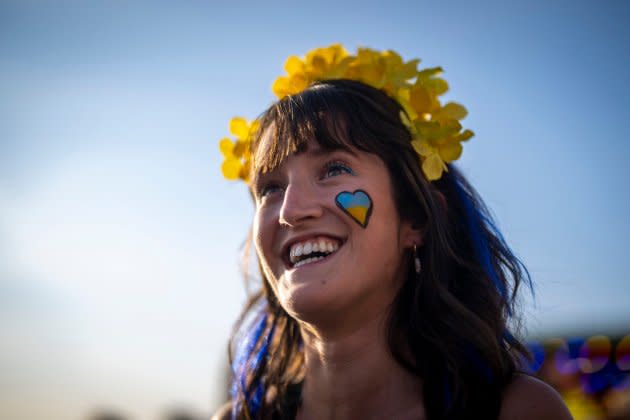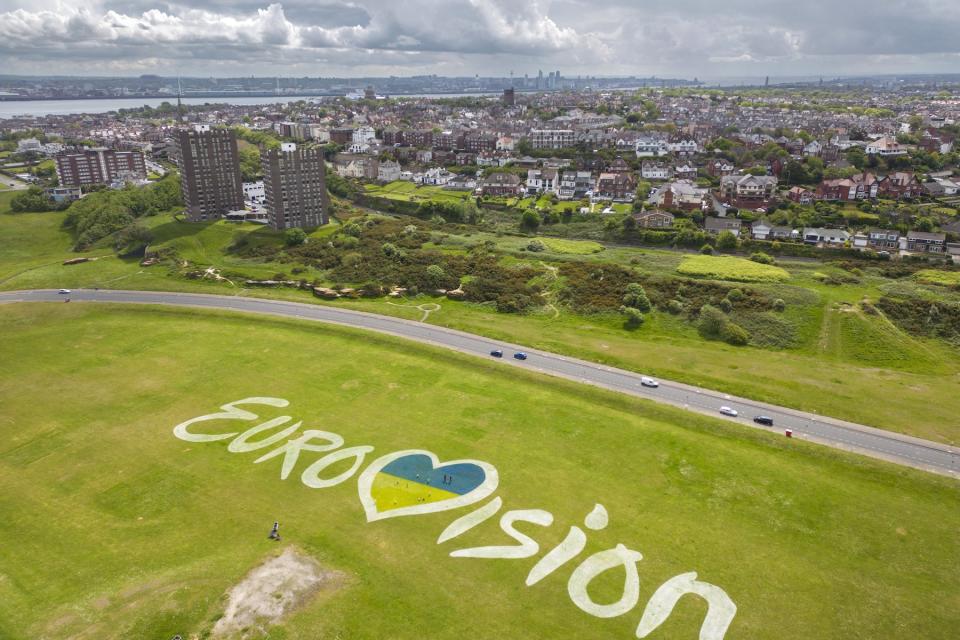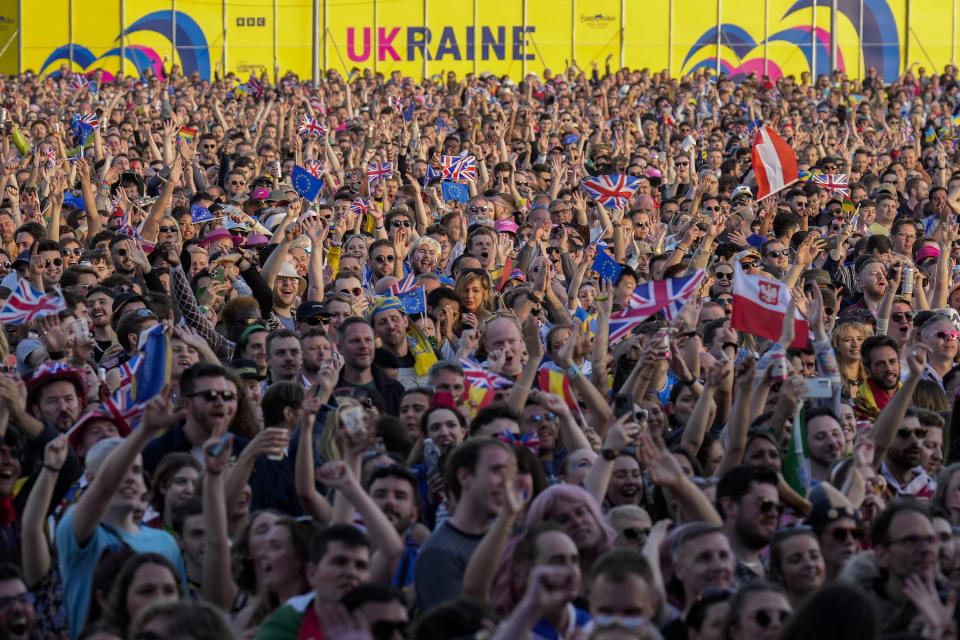Eurovision 2023 Is Magic and Everything King Charles’ Coronation Wasn’t

As a British person, I’ve spent a lot of my adult life despairing about the direction of my country. From Brexit, to our disastrous Conservative government ushering in an era of inequality, corruption and division, it’s been a steady drip-feed of bad things happening. Truthfully, I’ve now become accustomed to being disappointed. Even worse, I’ve become cynical.
It would be very easy to extend my now-natural cynicism to something like the Eurovision Song Contest, which has taken over Liverpool, England, this week. Founded in 1956, Eurovision is the world’s longest-running TV music contest, which has now evolved into a 43-country-strong spectacular with an estimated audience of 180 million. From Celine Dion to ABBA, its history is littered with huge stars, but the contest today is a place where music of all genres compete against some truly bizarre acts too. (This year, Croatia’s entry is a group of older men in drag, who strip off to their undergarments as a giant rocket flares in the background).
More from Rolling Stone
Eurovision 2023 Final: Sweden's Loreen Makes History in Stunning Fashion
U2 Announce Sphere Las Vegas Dates. The Edge Calls it a 'Quantum Leap Forward'
When it was announced that, as last year’s runners up, the U.K. would host the contest on behalf of Ukraine — 2022’s winners who were unable to host for safety reasons, owing to Russia’s invasion of the country — I initially felt nervous. How are we going to fuck this up? We’re going to make this all about us, aren’t we? Yet another thing that will go wrong…
But I’m here to say, in the bluntest terms: if you can walk around Liverpool and not be moved by what you see, then there is something wrong with you.
The entire city — the home of the Beatles, which practically lives and breathes music and culture — is draped in Ukrainian flags. From the ships at the historic docks, to a giant yellow submarine in the city center which has been painted blue and yellow in Ukraine’s honor. I even saw some plastic garbage bins outside a restaurant, which were neatly arranged in blue and yellow formation. It almost feels like Ukraine has been brought to England for one week.
It’s hard to pinpoint the precise energy of Eurovision: it’s part music festival, part LGBTQ+ Pride parade, but with more families and older people than you’d usually see in either of those places. (Some of the attendees I spoke to have been watching Eurovision since before I was born.) Walking around Liverpool, the buildings and fans are draped in flags from across the world, but there’s three flags you see more than any other: Ukraine, the U.K., and the LGBTQ+ rainbow.

Eurovision is officially a contest, sure, but it’s the sort of competition where people have several favorites and aren’t necessarily honorbound to support their own country. (A concept which might seem very foreign to some Americans). It’s a place where no act is too eccentric and, from a spectator standpoint, no outfit is too glittery and colorful. Anything goes.
As the sun shines across Liverpool’s stunning docks, I meet Kim, 58, and Maryna, 26. I was drawn toward them because, like many people, their outfits incorporated the British and Ukrainian flags. But there was an even more special story here: Maryna is a Ukrainian refugee and, one year ago, Kim took her into her home in North Wales. Maryna calls her host family her “guardian angels,” adding, “They’re like my second family. I’m really lucky to have them.”
Maryna echoes the words of Ukraine’s 2023 Eurovision entry, Tvorchi, who told Rolling Stone about how grateful they are for the U.K. hosting Eurovision for them. It’s a display of solidarity that has deeply moved her. “Walking around here, people are so interested in Ukraine and our culture. It has warmed my heart,” she says. “The U.K. hosting on behalf of Ukraine means the world to us.”
When Liverpool was announced as the host city for Eurovision, Kim knew that the pair had to come here together. “There is no other city that could have done it better than Liverpool. It’s the city of culture,”she tells me. “As soon as people know Maryna is from Ukraine, the support is overwhelming and positive.”
I’m from Scotland originally and, when the shortlist of potential host cities was announced, I was hoping Glasgow would be picked. But walking around Liverpool, even I must admit that Kim is right: Liverpool is the perfect place for Eurovision. It’s a city which practically screams culture and history, but also solidarity: shops refuse to stock Rupert Murdoch’s The Sun newspaper, after a decades-long boycott of the paper because of its inaccurate reporting of a deadly disaster at a football match in 1989, which sided with police and smeared victims. It’s a city where trade unionism and activism have been passed down through generations.
Walking around Liverpool, one thing I’m struck by is that, in almost every other context, if I were to encounter someone draped head-to-toe in the Union Jack flag I would probably give them a wide berth. Honestly? I’d view them with suspicion or, at the very least, cringe a little on their behalf. But at Eurovision, the Union Jack feels like a symbol that is genuinely positive — and even a little bit camp, or dare I say it: fun.
I found myself talking to Fran, 51 and Rachel, 34, who were both draped in Union Jacks and even had facepaint on. They have traveled to Liverpool from Bolton for the weekend. The pair have bonded over a shared love of Eurovision, having first gone to Portugal together for the contest in 2018. Now, it is one of their main shared interests, so when the U.K. finally placed highly last year, they knew they would attend. “We did so well last year and it’s been so nice to see us [the U.K.] have our confidence back,” Rachel says.
Fran tells me the pair have made lots of friends in Liverpool and have spoken to people from across the world. She thinks part of the fun atmosphere is created by the fact that it’s OK for people to support lots of different countries, and that you can appreciate the more high-brow songs alongside the “guilty pleasure” performances. And this time, the contest has a whole new meaning for her. “It’s such an emotional thing for me,” she says, of the U.K. hosting for Ukraine. “It’s just so difficult to comprehend what they’ve been through, isn’t it? And if we can give them something to feel good about, we should do it.”
I said earlier that Eurovision feels quite like LGBTQ+ Pride. The contest has always been a subject of fascination among gay fans in particular, walking the line between high and low art which preoccupies so much of gay culture. But in the last decade or so, after Austrian drag superstar Conchita Wurst won in 2014 with the empowering anthem “Rise Like a Phoenix,” the contest has become a de facto Pride festival. Walking around Liverpool it’s impossible not to notice the rainbow flags and the queer people everywhere you go. At night, the city becomes one big gay club night. Here, LGBTQ+ people are taking up visual space which they simply don’t in day-to-day life, whether it’s holding hands, dressing in drag or wearing a glittery outfit. “Eurovision almost feels more gay than Pride,” says Oliver, 28, from London. “It feels very safe here,” says his boyfriend Fraser, who is wearing a bright fuschia ruffled blouse. “It’s almost like the contest gives you permission to dress any way you want.”

As Eurovision prepares to crown a champion on Saturday, there is a noticeable contrast with last weekend, where King Charles III was crowned in London. It was an event that you didn’t need to be a paid-up cynic like me to feel cynical about: an unelected billionaire being celebrated with stolen jewels in a country where it feels like even the most basic public services are falling apart.
It would be easy to dwell on similar hypocrisies when it comes to the U.K. hosting Eurovision. Like the coronation, some might say the contest is an unnecessary expense when people are struggling. Others might correctly point out that the U.K. hasn’t shown its allies in Europe much grace in the last few years, or that waving Union Jacks at a time when the government has dismantled so much that is good about our country feels absurd.
If this was a normal year and the U.K. was hosting on behalf of ourselves, I’d be inclined to agree with that. But this year, it feels like we’re proud of ourselves for something that’s actually worth being proud of. Ukraine has guided us to a place of humility and grace that is often missing from British patriotism, which can sometimes feel obnoxious and lack self-awareness. After becoming so used to the U.K. disappointing me, it feels unnerving to feel a sense of national pride, but fuck it: I really do.
In the run-up to the King’s coronation last weekend, one thing I heard people saying over and over again on TV was that the royal family is the “only thing that brings the U.K. together.” What a load of rubbish, I thought, angrily. Even when our nation is as divided as it often seems, there are still lots of other things which bring us together. In Liverpool, where the words “UNITED BY MUSIC” are emblazoned across the city in Eurovision’s blue and yellow font, that couldn’t be more clear.
At the fan village, I speak to Deborah, 33. She is sitting on a bench and drinking a prosecco from the extortionately overpriced bar opposite. “The U.K. has been so negative about ourselves with Eurovision for so many years. I think we let it become almost like proof that Europe hates us or something,” she says. “We let it get into our heads.”
I ask if she thinks that says anything bigger about the U.K right now. “It’s been such a shit ten years, let’s be honest,” she says. “But this makes me think that maybe we can turn it around?”
Best of Rolling Stone

